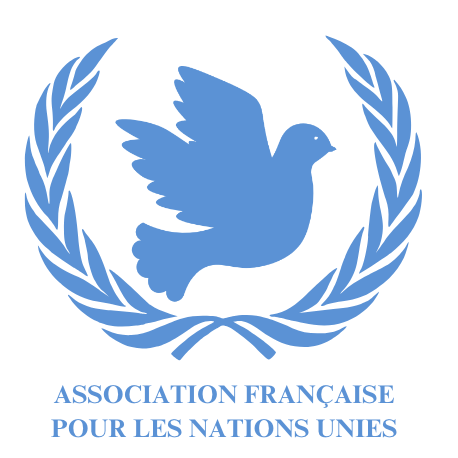HISTORY
The French Association for the League of Nations (AFSDN), predecessor to AFNU, was created on the 10th of November, 1918. Léon Bourgeois was first president of the Association, Senator, twelve-times Minister and President of Council under the French Third Republic. His speech in front of the General Assembly of the French Association for the League of Nations (AFSDN) on November 10th, 1918 can be found here.
Léon Bourgeois is a political, legal and philosophical author. In the political domain, his contemporaries owe him the credit, among other things, for the creation of dispensaries for social hygiene and anti-tuberculosis prevention, the innovation of weekly breaks, labour insurance, the establishment for salaries for married women, etc. Léon Bourgeois was also the founder of a philosophical and humanitarian doctrine called “Solidarism” which made solidarity the basis of society. He explained his doctrine in a magazine entitled ‘’La Solidarité’’ which marked his vision and thoughts on international relations. It is however, in his endeavours for peace building, that Bourgeois acquired his greater prestige. His idea was to make law the regulator and the pitch for all nations, aiming to obtain perpetual peace.
By creating the French Association for the League of Nations on November 10th, 1918, Léon Bourgeois wanted to lay a foundation for the future society of nations. In 1919, he served as the first President of the League of Nations. As President of AFSDN and the League of Nations, he was a pioneer on international issues, ranging from the control of armaments to the creation of an Arbitration Court. Many years later, this Arbitration court became the International Court of Justice (ICJ). His book ‘’The Work of the League of Nations’’ (1920-1923) presents a general vision on international law, peace and the relationship of nations. He received the Nobel Peace Prize in 1920 for his professional work and beliefs. The great scholar and founding member Paul APPEL succeeded Léon Bourgeois as President of the Association, followed by Emile BOREl.
Before WWII, the Association’s main goal was to improve the conditions of political prisoners. The Association created a number of groups in local communities, introduced a veritable international grouping of universities – a tradition in which was re-established with the current Academic college, organised international vacations and took the initiative of rich demonstrations in favour of peace, while creating a periodical for the League of Nations entitled “Peace through Law” and a newsletter, “the United People”.
From its beginnings, the Association rapidly obtained over 3000 members, and proposed from its foundation the following objectives:
To raise awareness among French public opinion on objectives of the League of Nations, to make the association known – along with its mode of operation, activities of its specialized agencies and committees, to inform on its achievements and to disclose activities.
To study in detail legal, economic and social issues arisen in relations between France and other States, intervention by multilateral instrument – one which holds a special place in contemporary international relations
To collaborate with associations abroad that hold the same objectives, and to assist the French government to resolve any difficulties that may arise in the realization of such an idea.
After the failure of the League of Nations, the tragedies of WWII (during which many of its committed founding members were killed), the founding of the UN with entry into force of the Charter of the United Nations on the 24th of October, 1945, AFSDN becomes the French Association for the United Nations (AFNU).
From 1946 to 1970, AFNU was chaired by Joseph PAUL-BONCOUR, Minister, Former Representative of France to the League of Nations in 1936 and a Delegate to the San Francisco Conference (where he signed the UN Charter). He also played a major role in strengthening the international influence of AFNU, met Mrs. Roosevelt and acted as a strong intermediary between administration and civil society by sensitizing both parties to ideals of the UN. The former Deputy Secretary General of the UN and Permanent Representative of France to the Security Council (1956-1959), Guillaume GEORGES-PICOT, succeeded Joseph PAUL-BONCOUR from 1970, followed by Presidents of AFNU René Jean DUPUY, Mario BETTATI, both professors of law, and André LEWIN until 2013, former spokesman of the Secretary General of the United Nations Kurt Waldheim.
In addition, several vice-presidents of AFNU served as great influencers in the fields of politics and culture. Some notable examples are: Paul APPELL, Alexandre MILLERAND, Paul PAINLEVE, RAIBERTI, Stéphane DERVILLE, Albert THOMAS, Ferdinand BUISSON, Marcel PREVOST, Léon VIALA, Emile Borel, René CASSIN, Jean KREHER, Paul LE GAL, Emile PIERRET-GERARD, the R.P. Michel RIQUET and more recently, Stéphane HESSEL and Claude de KEMOULARIA.
The Association has been recognized as a public utility by a decree dated 30th of January, 1922. Its means of action, inherited from a history lasting nearly a century, continues to diversify. AFNU ensures publication of a weekly press review, and makes available to its members and the public all specialized information published by the United Nations. AFNU organises conferences, symposiums and forums on current issues. AFNU works towards creating a stronger and more effective UN through the commitment of its members who share a global perspective and support the development and continuation of international cooperation. AFNU is a member of the World Federation of United Nations Associations (WFUNA).
